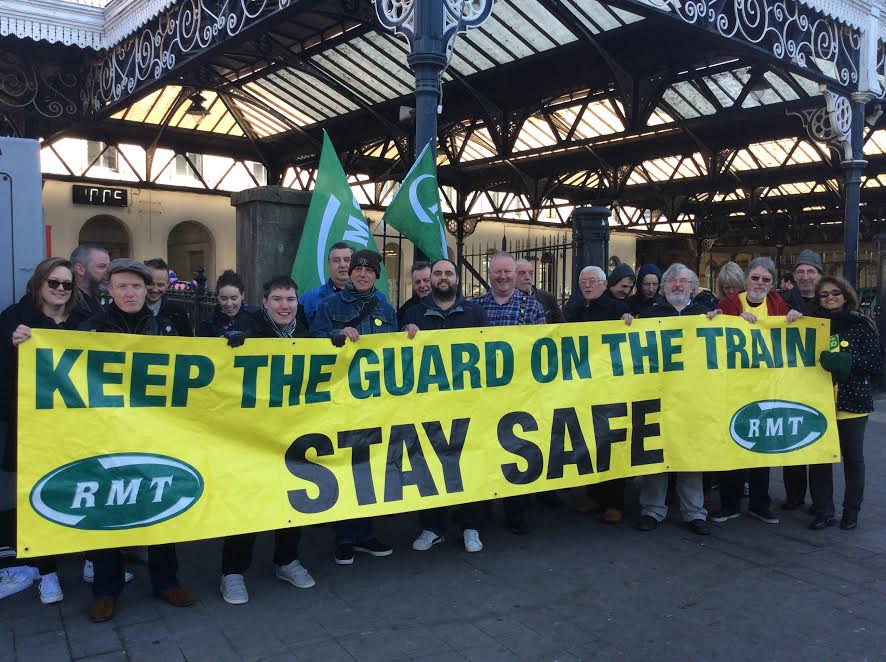Talks have broken down between Southern train bosses and representatives of the guards’ union, the RMT.
The two sides met at the conciliation service ACAS today (Tuesday 14 February) to try to bring an end to the long-running dispute.
The meeting came almost two weeks after Southern’s parent company Govia Thameslink Railway (GTR) agreed a deal with the train drivers’ union ASLEF.
Each side blamed the other and said that they had come to the table in good faith and with hope.
The two unions – the RMT and ASLEF – have taken industrial action over the staffing of new trains, known as driver-only operation.
CCTV monitors in the drivers’ cab is intended to enable the drivers to shut the train doors before pulling away from station platforms. Previously the guards – or conductors – were responsible for closing the doors.
The old trains were not able to run without a guard. The new system is intended to reduce the number of delayed and cancelled trains but the unions fear job losses and have highlighted safety concerns.
They also have concerns about access for disabled people, particularly as more stations shed staff and more stations are unstaffed for some or all of the time.

GTR said that guards would become on-board supervisors and guaranteed that no jobs would be lost under its current contract with the Department for Transport (DfT).
The company also said that trains would continue to run with a second member of staff on board apart from in exceptional circumstances.
It has agreed a deal with ASLEF but has still not been able to win round the RMT, having imposed new contracts on staff rather than bring them in through negotiation.
GTR’s chief operating officer Nick Brown said: “We came to today’s meeting hopeful we could find a way forward to end the RMT’s dispute and we’re saddened it’s ended so prematurely.
“The travelling public will find the union’s obstinate refusal to engage in meaningful and constructive talks disappointing, disheartening and increasingly destructive.
“Over the past year the RMT has had 28 days of strikes on this one issue. We’ve seen in excess of 20,000 trains cancelled as a result, thousands of journeys disrupted, people’s work and family lives badly impacted and the cost to the regional economy is in excess of £300 million.
“Conductors in the RMT union transferred to the new customer service role (on-board supervisor) from the beginning of last month and are now operating effectively in that role.
“Her Majesty’s Chief Inspector of Rail – the highest industry authority in the land – also says that drivers in sole control of the train is a safe method of operation.

“So the conclusion that most reasonable people will reach is that the RMT is seeking to hang on to its power to cancel trains.
“We’ve fully implemented our modernisation programme with the driver opening and closing the doors and a second person focused on customer service on our trains.
“Everyone is sick and tired of the RMT’s strikes and their pointless and intransigent stance needs to stop – and stop now.”
The RMT accused Southern of making a mockery of the talks by refusing to give any safety guarantees and blocking any chance of serious negotiations.
RMT general secretary Mick Cash said: “RMT entered today’s talks in good faith but it soon became clear that the only thing Southern were interested in was bulldozing through driver-only operation further and faster with safety and access to services not even on their agenda.
“That pig-headed attitude has today wrecked the talks process.
“Not only have Southern refused point blank to give a guarantee on a second safety-critical member of staff but the company have also made it clear that the deal set up by the TUC in the drivers’ dispute is even worse than we first expected and gives Southern a free run to kick the legs from under our members who have fought for nearly a year on the principles of safety and access.
“RMT’s negotiating team is furious at the way this union and its members have been treated.
“This is dire news not just for staff but for passengers who rightly demand a safe, reliable and accessible service.”
ASLEF members are currently voting on the agreement and the result of the train drivers’ ballot is expected on Thursday (16 February).







